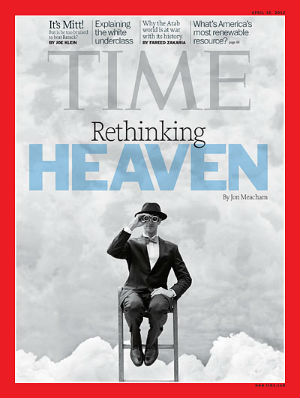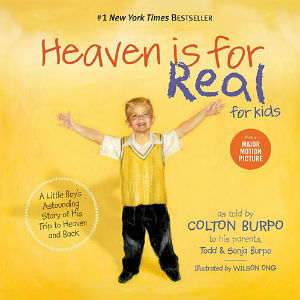 C.S. Lewis
C.S. LewisBy Neil Earle

Heaven is one of the most popular subjects. The variety of opinions on this subject stem from one clear fact – “Eye has not seen, ear has not heard what God has prepared for those that love him” (1 Corinthians 2:9). And Paul ascended to heaven in vision but was forbidden to report on it as he says in 2 Corinthians 12:1-5.
Thus language can fail us on this subject. One reason we should treat the various reports of trips to heaven on sale at Walmart very carefully.
Here is a secondary reason to study this subject – to get us out of “strict literalism” in reading Scripture as in the fact that the four Hebrew-Greek words for “Hell” are given the one word in the King James Version which complicates the subject.
In fact the Bible itself describes at least three heavens pivoting off Paul’s being taken to “the third heaven” in 2 Corinthians. There is the sky above us, then the “heavens” i.e. the cosmos, and finally the third heaven as the abode of God’s throne.
Here’s another complication to be aware of before digging into the subject, Bible writers were not necessarily flat earth adherents but the ancient 3-tiered worldview colored their writings. We now know our place on a round earth in an immense cosmos means we have to read carefully terms such as “up” or “down.”
The ancient 3-tiered view was:
Gods above,
Man below,
Dark Forces beneath.
 C.S. Lewis
C.S. LewisAs our best theologians have reminded us – the Bible often points beyond itself. It intimates that some teaching eludes our earth-centered concepts. In 1 Samuel 7:1-6 God gently chides King David for wanting to “build him a house.” God’s response is almost humorous – “Do I need a house? Come on, now really.” In 1 Kings 8:27-30 at the dedication of the temple Solomon bluntly states that even “the heaven of heavens” cannot contain God.
This is good to remember. Humans so easily turn the work of their puny hands – mere limited reputations – into a rival for God. It is the same with our mental concepts. The Jewish nation clearly made an idol of the temple – a big mistake (Matthew 24:1-3; Jeremiah 7). As our GCI.ORG website says, heaven is where God pleases to dwell but he is bigger than heaven. Heaven is the shorthand Bible term for being in God’s presence.
God promises to shake the heaven and the earth in the future (Haggai 2:6) which implies that heaven is real as the resting place of the righteous dead but only the temporary abode. Having conceded these points guarding us from an over-valuation with heaven, note two clear passages:
– Philippians 1:23, “My desire is to depart and be with Christ”
– 2 Corinthians 5:8, “We would rather be away from the body and be at home with the Lord.”
 Some personal reports can be charming especially if they comport well with Scripture.
Some personal reports can be charming especially if they comport well with Scripture.As the GCI web site states, Christians already have access to heaven. Note these:
– John 17:24, “Father I want those you gave me to be with me so they may see my glory”
– Ephesians 2:6, “In our union with Christ Jesus he raised us up with him to rule with him in the heavenly realms”
– Hebrews 10:19, Christ opened the way for us to enter the heavenly sanctuary!
Colorful and visionary books such as Revelation have to be read carefully but it is hard to evade some of the word pictures given to us. The Fifth Seal when unveiled depicts martyred saints in heaven called “souls” possessing full reasoning faculties conversing with God and singing and following his leadership (Revelation 6:9-11; 14:3). This echoes Hebrews 11:23 and our communion with “the spirits of just men” being made perfect and refreshed in heaven.
The Reformer John Calvin saw this point clearly. He described Revelation 6 as depicting “the beginning of the saints’ rest.” The white robes signified the beginning of their entrance into eternal rest but Calvin knew a far greater fulfillment awaited at the Resurrection of the Just when the body and soul are reunited and the New Jerusalem comes down from heaven as the final reward of the saints.
 N.T. Wright
N.T. WrightToo many churches teach going to heaven as the end of it all but Anglican Bishop N.T. Wright has been trying to convince all who will listen that the Bible actually teaches “life after life after death.” Heaven is the resting place, the Refreshment of the righteous, not their ultimate reward which is greater still.
Richard Baxter in 1650 summarized it this way:
“What is the saint’s everlasting rest? It is the perfect endless enjoyment of God by the perfected believers, to which their souls arrive at death. Further, it is that eternal enjoyment of God to which both soul and body arrive most fully after the resurrection and final judgment.”
In summary, Heaven is where God is. It is also real, a present reality as the temporary abode of the righteous dead as they await their final great resurrection which sees each perfected spirit resurrected with a glorified body. Christ brings back with him the righteous dead at his return (1 Thessalonians 3:14). Either way, heaven is a grand place to think about as we reach the end of our journeys.